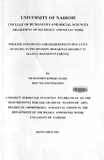| dc.description.abstract | Marakwet-Pokot cattle rustling have led to great suffering to the people of Tot Division in Kerio Valley for a very long time; defying interventions from the local community, civil society and the state. Many lives and property have been lost, as well as the internal displacement of people and abrupt closure of schools and businesses. This study assessed the effects of policing strategies on cattle rustling in Tot Division, Marakwet District.
The general objective of the study was to assess the effects of policing strategies on cattle rustling in Northern Kenya. The study involved 77 respondents, from two categories. There were 28 respondents from various police units and 49 respondents from the local community residents in the categories of elders, women and youth. 14 key informants were purposively selected from provincial administration officers, religious leaders, leaders of NGOs and CBOS dealing with conflicts. The respondents were selected through stratified sampling. The data was collected using questionnaires, key informant guide and observations in the field. The study utilized survey design to achieve its objectives. The study generated and utilized both qualitative and quantitative data. The quantitative data was analyzed using SPSS computer program and described using descriptive statistics. The qualitative data was analyzed using themes and trend analysis. The data was presented in frequency tables, percentages and charts.
The study found out that cattle rustling in Tot Division led to loss of live and property, displacement of people, closing of businesses, poverty and under development. The study established that the following policing strategies were engaged to fight cattle rustling in Tot: peace building and restoration, deployment of more police officers, disarmament, arrest and prosecution, gathering of intelligence, stopping illegal arms and livestock trade, laws and policy framework, community policing and free and compulsory education. The study established that, the following socio-economic, political, cultural and environmental factors in the society impede the functioning of policing strategies in the area: cultural support for cattle rustling, political influence, organization of illegal arms and livestock trade, poverty and youth unemployment, rough terrain and hot weather conditions, and finally police low morale, poor equipments and training. The study found out that the policing strategies employed were not very effective in preventing cattle rustling.
However some succeeded to a limited extent. The study recommended that the government should conduct continuous disarmament and ensure the country's porous borders are properly manned to prevent entry of illegal firearms and guarantee the security of the pastoralist communities living along the border. The government should also facilitate police officers adequately and develop the pastoralist areas to spur economic growth to provide them with alternative livelihood beside pastoralism. The government, civil society and the local community leaders should encourage education among the pastoralists by building more schools and provide sponsorships. | en_US |

